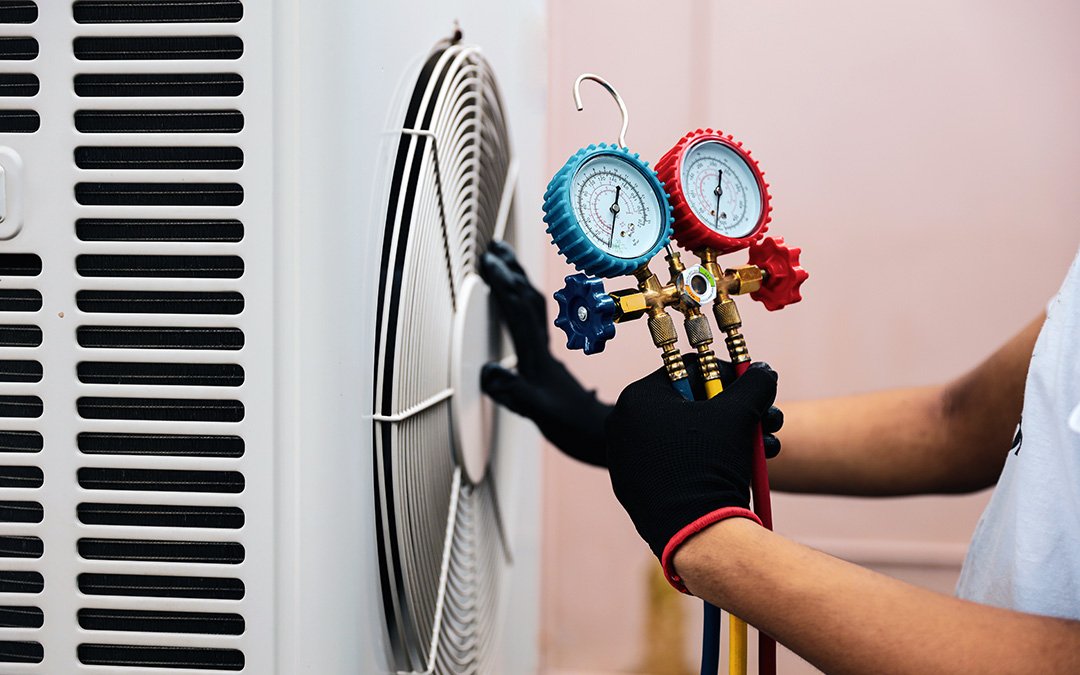Your air conditioning system is essential for maintaining a comfortable home, but like all appliances, it won’t last forever. At some point, you’ll face a critical decision: should you repair your unit or replace it entirely? Making the right choice can save you money, improve energy efficiency, and enhance your home’s overall comfort. Below, we’ll break down key factors to help you determine when it’s time to replace your AC unit rather than opting for another repair.
1. The Age of Your AC Unit
Air conditioning systems have a typical lifespan of 10-15 years. If your unit is approaching or surpassing this age range, replacement is often the better option. Older units lose efficiency, break down more frequently, and may use outdated refrigerants such as R-22, which is no longer in production.
2. Rising Energy Bills
Have you noticed a steady increase in your energy bills despite regular maintenance? Older AC units become less efficient over time, requiring more energy to maintain the same level of cooling. A new, energy-efficient model can significantly reduce your monthly utility costs and may even qualify you for rebates or tax credits.
3. Frequent and Costly Repairs
If your AC unit needs constant repairs, it may be more cost-effective to replace it. A good rule of thumb is the 50% Rule: if the cost of repairs exceeds 50% of the price of a new system, replacement is the smarter investment. Additionally, if you find yourself calling an HVAC technician multiple times a year, the inconvenience and costs can quickly add up.
4. Uneven Cooling
Are some rooms in your home consistently too hot or too cold? This could indicate that your AC system is no longer capable of distributing air evenly. While ductwork issues could be a factor, an aging or undersized system may struggle to meet your home’s demands, making replacement a more practical solution.
5. Strange Noises or Odors
Unusual noises such as banging, rattling, or grinding can signal serious internal damage. Likewise, foul or musty odors could indicate mold growth, electrical issues, or a failing motor. While some problems can be repaired, persistent or worsening symptoms often suggest it’s time for a new unit.
6. Use of Outdated Technology
Modern AC units are far more energy-efficient than older models, thanks to advancements in technology. If your current system lacks features such as programmable thermostats, variable-speed motors, or smart home compatibility, upgrading could improve efficiency and convenience. Newer units are also designed to comply with updated environmental regulations, using eco-friendly refrigerants and meeting higher energy standards.
7. Poor Indoor Air Quality
Your AC system plays a crucial role in maintaining indoor air quality. If you’ve noticed an increase in dust, humidity issues, or worsened allergy symptoms, your system may no longer be effectively filtering and circulating air. Newer models come with improved filtration and humidity control features, making them a healthier choice for your home.
8. Safety Concerns
Older AC units can pose safety risks, especially if they develop electrical issues that could lead to short circuits or fire hazards. If a technician identifies a serious safety issue, replacement is the best course of action to protect your household.
9. The Cost-Benefit Analysis of Replacement
While replacing an AC unit is a significant investment, the long-term savings on repairs, energy bills, and improved efficiency can outweigh the initial cost. Additionally, many HVAC manufacturers offer financing options, warranties, and rebates to make the upgrade more affordable.
When a Repair Might Be the Better Choice
While replacement is the best option in many cases, there are situations where a repair makes more sense:
- Your AC unit is less than 10 years old and has been well-maintained.
- The repair is minor and inexpensive (e.g., replacing a capacitor or thermostat).
- You plan to sell your home soon and don’t want to invest in a new system.
Deciding between repairing and replacing your AC unit depends on factors like age, efficiency, repair costs, and overall performance. If your unit is over 10-15 years old, requires frequent repairs, or struggles to maintain comfort, investing in a new system is often the best long-term solution. Consulting with a professional HVAC technician can provide you with expert advice tailored to your home’s needs.
By staying proactive about your AC system, you can ensure your home remains comfortable, energy-efficient, and safe for years to come.
If you need heating and cooling services for your home this summer, you can count on Palmetto Heating and Air to answer all of your questions and get the job done right. With decades of industry experience, our certified HVAC technicians will optimize your indoor comfort with our premium HVAC services. Connect with our team today for top-quality maintenance, repair or installation in Southeastern South Carolina & Northeastern Georgia.



Recent Comments